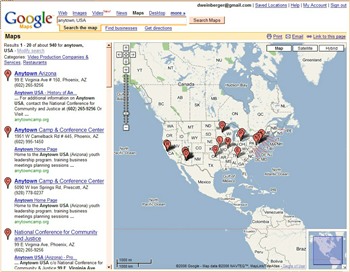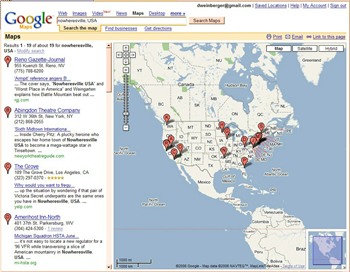October 10, 2006
[berkman] Dan Burk on Open Source science
Dan Burk from U of Minnesota Law School is talking about open source science. [As always, I’m paraphrasing at best.]
He notes some strands of open sourciness. 1. Open Source Genomics saw a clash of the scientific and hacking cultures. 2. Open Source patenting wonders if what worked for sw could work for biotech licensing. 3. Cyberinfrastructure (= e-science), i.e., use of networks to do collaborative science, enables transborder collaboration.
Dan looks at scientific norms as proposed by Merton: Communalism, universalism, independence, organized skepticism and originality. Not that science always achieves this ideals, he says. But if you follow these norms, you get scientific reward, including the respect of one’s peers. in the 1980s, Rebecca Isenberg, among others, pointed to the “intellectual property” system as providing another set of rewards: Money. But that can require secrecy and exclusion, which works against the reputational reward. Patents at least require disclosing what you’ve learned, as opposed to trade secrets. The Human Genome Project in the ’90s started patenting snippets of DNA. They agreed to “Bermuda” rules, making info public within 24 hours.
The new cyberinfrastructure that enables e-science is Internet- and grid-enabled. People share the info through collaboratories (virtual environments). But whose patent law applies to something discovered in a virtual world? The US assigns inventorship based on where you’re located, which is hard to apply. An agreement beforehand would help. Open Source licensing might be a model.
There are two justifications for Open Source coding: It’s practical because it flushes out bugs, and it’s moral. To keep it from being captured, licenses travel with the code with norms that are similar to the scientific norms: Communal, reputational rewards, no forking, leadership, and licensing strategies. Can bio-med sciences adopt this licensing scheme? A couple have tried: the Haplotype Mapping project uses OS-style licenses. The BIOS project makes physical tools (enzymes) and requires you to contribute back to the system any improvements of the tools you make, although you can patent what you make with the tools. The Science Commons uses OS-style licenses for literature.
Dan points to unsettled issues about patents that could be a problem for open science. There’s patent pooling, reverse “reach through” licenses and reverse “grant backs.” Are some of these licenses intended to discourage patents, which the US would consider a bad thing?
There are also cultural impediments, he says. “Science has a much more structured set of institutions than Open Source generally does.” There are universities, funding agencies and labs who have interests in what gets developed. There are also systemic differences: Peer review, publication, scientific societies.
Q: Say more about the patent misuse question
A: A patent gives someone exclusive rights in order to promote progress, to have an incentive, to recoup the investment. The assumption is that that’s good. It will spur science. If you license your patents in a bad way—charge for a license beyond the term of the patent, e.g.—your patent gets curbed. If an OS license says that you can’t patent anything you discover with it, you’re using your patent to discourage patents and it might count as a misuse. SCO said OS discourages the development of “intellectual property.” That argument didn’t go anywhere, but it’s still lurking there. Robin Feldman has a good paper on this. She thinks these licenses could be pro-competitive.
One of the strategies is to forbid patents of developments within the area of the original patent but allow patents for developments outside of that area.
Q: Is there a fundamental difference between the innovations that should be promoted by OS and those promoted by patents and the proprietary?
A: We don’t know but that may be the case. One of the things to worry about is whether open approaches are self-sustaining. The examples in Yochai Benkler’s The Wealth of Networks are of people funded by their business or university.
Q: (me) Assuming we’re going to have both OS and proprietary science, how do the ambiguities get resolved?
A: We’ve had both systems for a long time: Patents and reputational reward. Now they’ve intersected. Generally they accommodate each other. Biomed scientists are figuring out that if they want the reputational reward they have to do X, if they want the patent they have have to do Y. If you view OS as an extension of that (and remember, he says, that the hacker mentality comes out of universities, just as reputational science does), it seems to be working. OS has been around for a while and we really don’t have any cases, outside of a case in the Netherlands last year. OS licenses seem to be enforceable. We may not get decisions quickly. For one thing, business cares about making money, not so much about “intellectual property” for its own sake. There aren’t that many “IP” cases and it may be the same in this area. Also, typically you don’t get a lot of action in the “IP” area until there’s a lot of money at stake. So far, there isn’t. There will be, though. Patent litigation costs $5-10M, so something worthwhile has to be at stake.
Q: Joseph Stiglitz (sp) has shown that prizes work well as incentives.
A: It’s interesting but contested work. In some situations it may well work, in many it won’t, and we’ll have to figure out those situations are. This was Alexander Hamilton’s approach. He liked the French idea of having a system of prizes instead of patents.
Q: How is the scientific culture changing?
A: There seems to be a gender difference in how scientists group. The big divide is between academic and commercial researchers. To get scientists out of academic into commerce, employers have had to provide some of the openness they’re used to in the academy. But the more a commercial scientist wants to join an online group or a collaboratory, there’s more risk of trade secret leakage.
In conversation, Dan recommends a site about an upcoming conference on cyberinfrastructure.
[Tags: science open_science open_source dan_burk berkman patents]












